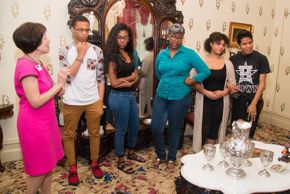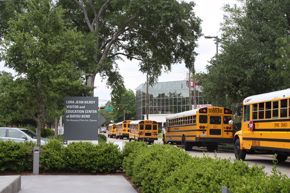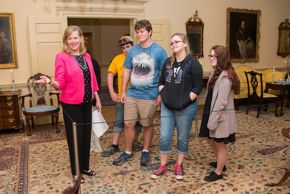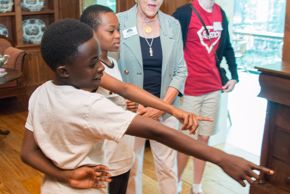Bayou Bend School Tours
American History Comes Alive at Bayou Bend
FREE School Tours
Bayou Bend invites students to an interactive tour experience that focuses on small-group discussions and historical thinking skills. School tours are appropriate for ages 9 and up.
Level I: Nation of Innovation
Students divide into groups to study the development of technologies in three areas that changed the lives of Americans forever: transportation; making textiles; and providing for light, heat, and cleanliness. Hands-on activities to demonstrate why technologies that seem old-fashioned today were seen as life-changing 200 years ago.
- This program is appropriate for students who would enjoy an active, hands-on experience that does not require extensive reading or writing.
- View a video to help you prepare for Nation of Innovation.
Level II: Collectively American
The question “What does it mean to be an American?” has been part of the national conversation for centuries. In this tour, students work together to select objects from the Bayou Bend collection that reflect the ways Americans have answered this question at different times in the nation’s history. The tour is accompanied by an activity constructing the biographies of several well-known Americans.
- This program is appropriate for classes seeking an experience focused on analysis of primary sources and the development and support of arguments based on historical evidence.
- Pre-visit resources
- Post-visit resources
- Images and information about the objects, organized by room:
- Timeline used in the program
Collection Tour
Nation of Innovation and Collectively American focus on history education and critical thinking. If your class has a specialty focus such as studio art or interior design, please contact us to arrange a tour of the collection. Collection tours are most appropriate for middle-school and high-school students.
Deciding to Visit
How do we make a reservation?
Contact 713.639.7750 or bayoubend@mfah.org to begin the reservation process. Reservations are requested for self-guided groups because the house closes occasionally for special programs or maintenance.
How far in advance do we need to plan?
As much notice as possible is encouraged, but we require school tours be reserved a minimum of three weeks in advance.
When can we visit?
The “Nation of Innovation” and “Collectively American” tours are offered Tuesday, Wednesday, and Thursday mornings, September through May. Self-guided visits to the historic house are available Friday, Saturday, and Sunday afternoons and every day in August.
Who can visit?
Students of all ages are invited to visit the Visitor Center and the Bayou Bend gardens. Guided programs at the historic house are appropriate for students ages 9 and up.
How many students may participate?
Bayou Bend can accommodate a maximum of 96 students on one day. Larger school groups may visit over the course of multiple days.
What is the cost?
School visits to Bayou Bend are free. School bus scholarships are available by application.
How long does the visit last?
School visits last approximately two hours, including the tour of the historic house and activities in the visitor center.
How Does This Visit Support Texas State Standards?
“Nation of Innovation” (Level I) supports the following TEKS:
113.16.b.1.A—History
113.16.b.2.A, B—History
113.16.b.3.B—History
113.16.b.4.B, C, F—History
113.16.b.6.A—Geography
113.16.b.7.A—Geography
113.16.b.8.A-C—Geography
113.16.b.9.A, B—Geography
113.16.b.10.A, B—Economics
113.16.b.12.A, B—Economics
113.16.b.13.A-D—Economics
113.16.b.21.A, B—Culture
113.16.b.23.A-C—Science, technology, and society
113.16.b.24.A-E—Social studies skills
113.16.b.25.A-C—Social studies skills
113.16.b.26.A, B—Social studies skills
“Collectively American” (Level II) supports the following TEKS:
113.20.b.1.A, B—History
113.20.b.12.A-D—Economics
113.20.b.13.B—Economics
113.20.b.14.A—Economics
113.20.b.23.A-E—Culture
113.20.b.24.A, B—Culture
113.20.b.26.A-C—Culture
113.20.b.28.A, B—Science, technology, and society
113.20.b.29.A-F—Social studies skills
113.20.b.30.A, D—Social studies skills
113.20.b.31.A, B—Social studies skills
During Your Visit: FAQs
How should we prepare for our visit?
Please make sure all students are wearing name tags with their first names. Our programs are discussion-based and being able to call the students by name is very helpful to our docents (volunteer instructors).
Watch the pre-visit video to help your students understand where they are going and what they will be doing.
Will all my students have the same experience?
Students participate in activities at our Visitor Center classroom together. At the historic house, because of space restrictions, we divide students into three sections to see different parts of the house. Although there is some sharing time built into the program, we encourage you to have students share their learning back in the classroom!
Will my students see the whole historic house?
Students will spend most of their time working on activities in a selection of rooms at the historic house, but a walkthrough of the whole house is included in the tour.
May we bring our lunches?
There are a few picnic tables and a large lawn space near the Visitor Center and parking lot where groups are welcome to eat brown-bag lunches. Outside food and drink are not allowed in the historic gardens. Students may not chew gum at Bayou Bend.
May we take photographs?
You are welcome to take pictures anywhere on the property. No flash photography is allowed in the historic house. If you would like photographs of your visit to Bayou Bend, we recommend choosing a student or chaperone as “designated photographer,” as it can be disruptive to have all students taking photographs. However, if you have an assignment that would benefit from student photography, please let us know and we are happy to work with you!
May our group bring their phones or other personal electronics?
Unless a prior request has been made by the school, we do not allow students to make personal phone calls, text, or use phone apps during school programs, and we request that adult chaperones leave the classroom or historic house if they need to use their phones. (Please note that at the historic house adults will need to be escorted in and out by security staff and are not permitted to step into a different room by themselves due to security reasons.)
Is there parking for buses and carpools?
Yes, there is a large parking lot with free parking for buses and cars.
Is Bayou Bend accessible to children of all abilities?
Yes! But please let us know in advance if your group includes visitors with mobility impairments so that we can direct you to the accessible entrance.
Will students be able to work on an assignment during the visit?
We are happy to work with your students to complete assignments. Please provide us with a copy of the assignment at least two weeks before your visit so that the volunteers will be ready to help your students.
If I have questions before my visit, whom do I ask?
Call 713.639.7750 or e-mail bayoubend@mfah.org and we will be happy to help!
What if I need to cancel my visit?
Call 713.639.7750 or e-mail bayoubend@mfah.org to cancel the visit.
What happens if our group is late?
Please call 713.639.7750 as soon as possible to say that you are running late. In general, tours end on schedule, and the volunteers and staff will shorten the presentation to accommodate your arrival time.
Where do we enter and check in?
Your bus should proceed to the lower parking lot, where you will be met by Bayou Bend volunteers who will board the buses to orient your group. Your group will be divided as necessary, and then escorted to the beginning point of your program.
Backpacks, heavy coats, and umbrellas should remain on the bus. If your group plans to have lunch on the Visitor Center lawn, please leave the lunches on the bus until your scheduled lunch time.
How many chaperones should we bring?
We request that groups bring a maximum of ten chaperones. If your school needs to bring more chaperones, please let us know when making your reservation.
Preparation Videos
We suggest watching the pre-visit video for your program. This will help your students understand where they are going and what they will be doing while at Bayou Bend.
Education programs at Bayou Bend receive generous funding from Houston Junior Woman's Club; Mary Lynn and Steve Marks; Susan Vaughan Foundation; Denise Monteleone; Ms. Bobbie Nau; William A. and Madeline Welder Smith Foundation; and additional generous donors.
These education programs also receive income from funds provided by the Carol and Les Ballard Endowment; the Judy and Charles Tate Endowment; the James William Glanville and Nancy Hart Glanville Endowment; the Barbara Graham Williams Endowment; and the Bayou Bend Bonnie A. Campbell Education Programs Endowment.




